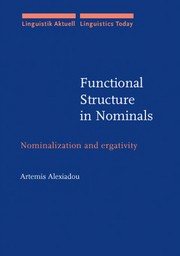Check nearby libraries
Buy this book

This edition doesn't have a description yet. Can you add one?
Check nearby libraries
Buy this book

Previews available in: English
Showing 1 featured edition. View all 1 editions?
| Edition | Availability |
|---|---|
|
1
Functional structure in nominals: nominalization and ergativity
2001, J. Benjamins
in English
1588110559 9781588110558
|
aaaa
Libraries near you:
WorldCat
|
Book Details
Table of Contents
Machine generated contents note: CHAPTER 1
Introduction i
1. Some theoretical and methodological preliminaries i
1.1 Verbs and deverbal nominals in English i
1.2 Derived nominals and gerunds 2
1.3 Word formation and the lexicon 3
1.4 Word and category formation in DM 6
2. An ambiguity in the nominal system 9
2.1 Process versus result nominals: Grimshaw's diagnostics lo
2.2 The role of the event argument 12
2.3 The VP analysis 14
3. The fine structure of process nominals: a first encounter 16
4. Nominalization patterns across languages 20
5. Outline 21
CHAPTER 2
The Functional Architecture of Nominalizations 27
1. Introduction 27
1.1 NPs are dominated by D 27
1.2 AgrP, NumberP and GenderP 29
1.3 On the A vs. A' status of Spec,DP 30
1.4 Some notes on the Greek DP 33
2. Greek nominal formation 35
2.1 General remarks 35
2.2 Nominals derived from transitive predicates 38
2.3 Nominals derived from intransitive predicates 40
2.4 Nominals derived from ditransitive predicates 42
2.5 Nominals derived from psychological predicates 45
3. The verbal properties of process nominals 47
3.1 DP-internal adverbs 47
3.2 Morphological reflexes 50
3.3 Aspectual distinctions 51
3.4 The structural differences between process and result nominals 56
4. Process nominals lack tense 59
4.1 Absence of phenomena related to T: EPP, ECM and raising 59
4.2 Evidence for nominal tense 63
5. On the obligatory licensing of arguments within process nominals 66
6. Processes in morphological structure 67
7. Conclusion 69
CHAPTER 3
Intransitivity in Nominalization 77
1. Event nominals are ergative constructions 78
1.1 Greek event nominals 78
1.2 Event nominals in English and other Germanic languages 80
1.3 Event nominals in Romance 81
1.4 Slavic event nominals 85
1.5 Semitic event nominals 87
1.6 Hungarian event nominals 89
2. On the properties of passive nominals 9o
2.1 Background 90
2.2 Affectedness and aspectual properties 93
2.3 Referential adjectives 103
2.4 No process of passivization 107
3. The structure of process nominals revisited in
4. By-phrases and more on the lack of external arguments 115
CHAPTER 4
Variation in Functional Structure 127
i. Variation in the set of verbal projections 127
1.1 Presence vs. absence of C 127
1.2 Presence vs. absence of Aspect 128
1.3 Variation depending on the type of v/Voice (transitive vs.
intransitive) 135
2. Variation in the set of nominal projections 143
2.1 Presence vs. absence of number: licensing of adjectival
modification 143
2.2 Variation depending on the type of D 144
3. Summary 157
CHAPTER 5
Nominalization and Ergativity 167
1. The Case patterns in nominalization and ergative languages 167
2. Unaccusativity in ergative languages 169
2.1 Ergative as a lexical case 169
2.2 v is deficient in ergative languages 171
3. Remarks on Case within DPs 173
3.1 Genitive is a structural case 173
3.2 Case as a morphological property 175
3.3 Locus of genitive 177
4. Agents, ergativity and the perfect 179
4.1 Background 182
4.2 The crosslinguistic distribution of the possessive agent 185
4.3 Possessor subjects in the perfect 188
5 Auxiliary selection 192
5.1 HAVE-BE and the perfect 192
5.2 Auxiliary selection languages and only HAVE languages 194
6. Conclusion 197
CHAPTER 6
Conclusions 211
References 215
Index 229.
Edition Notes
Includes bibliographical references (p. [215]-227) and index.
Classifications
The Physical Object
ID Numbers
Source records
Community Reviews (0)
Feedback?| November 19, 2022 | Edited by ImportBot | import existing book |
| December 3, 2020 | Edited by MARC Bot | import existing book |
| December 5, 2010 | Edited by Open Library Bot | Added subjects from MARC records. |
| February 6, 2010 | Edited by WorkBot | add more information to works |
| December 10, 2009 | Created by WorkBot | add works page |










